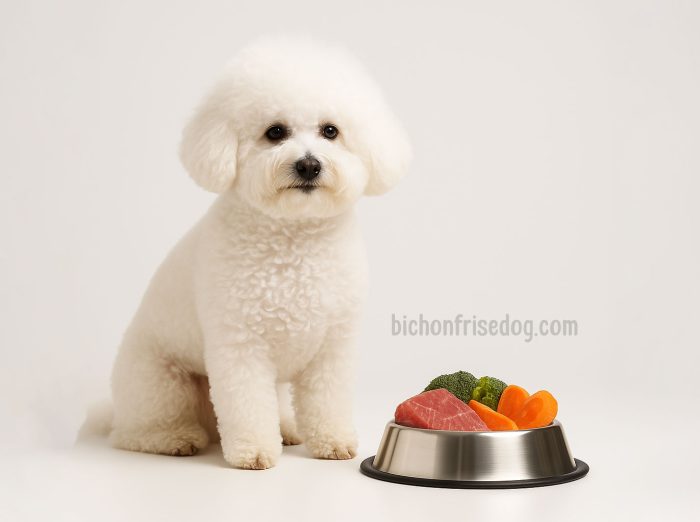🥩 Nutritional guidelines for a healthy Bichon Frise
A well-balanced diet is one of the most important pillars of health for the Bichon Frise. Ideally, their nutrition should consist of 80% animal-based protein and 20% fresh, nutrient-dense complements, such as vegetables, fruits, and healthy oils. This proportion mirrors what canines would naturally consume in the wild and helps support their immune system, coat health, and digestive function. For that reason, we do not recommend feeding Bichons commercial dry kibble or overly processed foods, which often contain fillers, artificial preservatives, and low-quality ingredients that can contribute to long-term health issues like allergies, diabetes, and skin conditions.
🐶 Feeding schedule by age
During the puppy stage (3 to 6 months), a Bichon Frise should eat four small meals a day, spaced out to provide a steady energy supply for growth and development. At 6 months and older, this can be reduced to two meals a day, which is a schedule most adult dogs maintain comfortably. However, the exact portion sizes should be adjusted based on your dog’s weight, activity level, and individual metabolism—a point where a canine nutritionist can be especially helpful.
Puppies typically start with soft, homemade porridges made from chicken (including skin for healthy fats), a small amount of rice, and hydrating bone broth. Over time, the diet can be enriched by gradually adding carrot, spinach, sweet potato, pumpkin, eggs, and other digestible vegetables. This not only ensures proper nutrient intake but also helps puppies transition smoothly to more complex meals.

🦴 Transition to BARF diet
At around 8 months of age, most Bichon Frisés are ready to transition to the BARF (Biologically Appropriate Raw Food) diet. This feeding style includes raw meats, bones, organs, vegetables, and eggs, and is carefully portioned to reflect a dog’s natural dietary needs. When done correctly, the BARF diet supports optimal weight, cleaner teeth, stronger immunity, and more energy.
🐾 If you choose to introduce BARF, be sure to do so gradually and under the guidance of a professional to ensure it’s balanced and safe for your dog’s age and condition.
🐕 Nutrition for senior Bichons
As your Bichon ages, their nutritional needs change significantly. Puppies and young adults can tolerate a higher fat content, around 12%–15%, which helps with energy and development. However, starting at 4 years old, this percentage should be reduced gradually to help prevent the development of lipomas (fatty tumors) and acne-like skin breakouts.
By the time they reach 7 or 8 years of age, their fat intake should be around 5% or less. At this stage, meals should focus on lean meats, such as turkey, chicken breast, and white fish, avoiding fatty cuts like pork belly or skin-on red meat. Digestion can also slow down with age, making it helpful to incorporate digestive enzymes, probiotics, and light post-meal walks—twice daily if possible—to support healthy bowel movements and avoid constipation.
👩⚕️ Tailored nutrition for every dog
It’s essential to remember that every dog is different. Genetics, lifestyle, activity level, and preexisting conditions all influence how a Bichon Frisé responds to certain foods. For this reason, we strongly recommend consulting a canine nutritionist to design a custom meal plan tailored specifically to your dog’s unique profile. With expert guidance, you can ensure your dog receives the proper balance of macronutrients, vitamins, and minerals at every stage of life.

